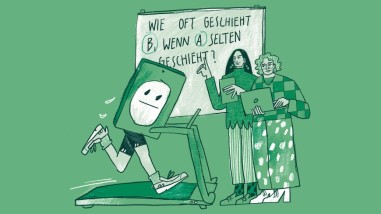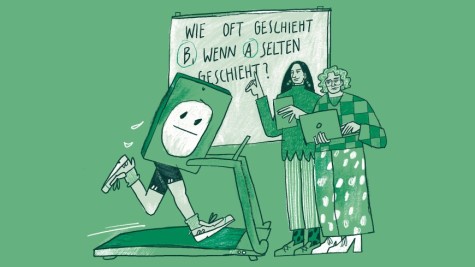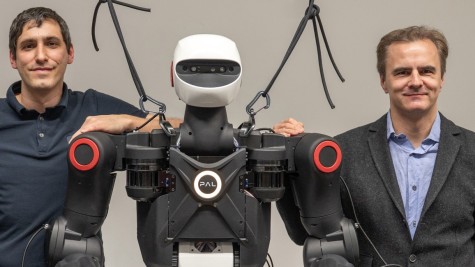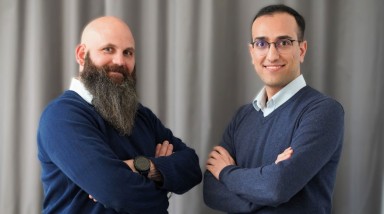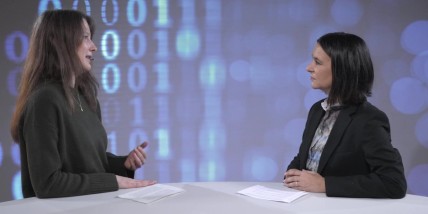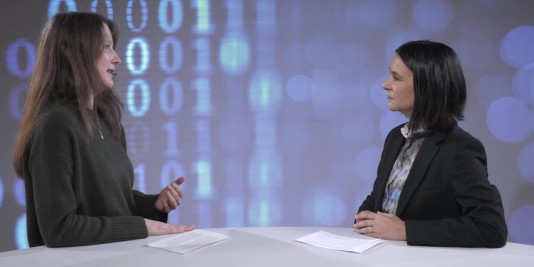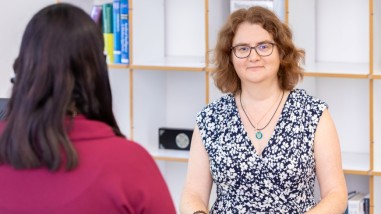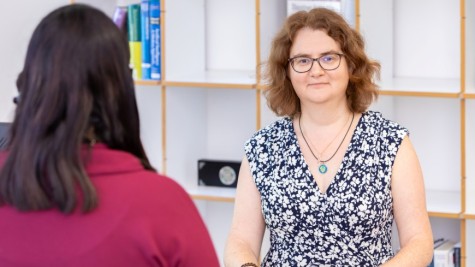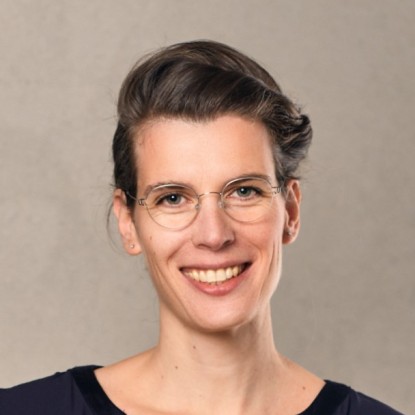-
![]()
![]()
DeepSeek-Modelle auf dem Prüfstand
In einem Gastbeitrag geben Professorin Iryna Gurevych und Irina Bigoulaeva vom Ubiquitous Knowledge Processing (UKP) Lab am Fachbereich Informatik der TU Darmstadt einen Einblick in ihre Forschung zum Leistungsvermögen von generativer Künstlicher Intelligenz.
-
![Dr. Oleg Arenz and Professor Jan Peters from the IAS Group at TU Darmstadt standing next to a PAL Robotics humanoid robot, with their hands resting on its shoulders.]() Picture: Patrick Bal
Picture: Patrick Bal![Dr. Oleg Arenz and Professor Jan Peters from the IAS Group at TU Darmstadt standing next to a PAL Robotics humanoid robot, with their hands resting on its shoulders.]() Picture: Patrick Bal
Picture: Patrick Bal“A unique opportunity for Darmstadt as a center for AI and robotics research”
Prof. Jan Peters and Dr. Oleg Arenz discuss the humanoid robot HAINER and the state of AI research at TU Darmstadt
-
![]() Picture: chayapon - stock.adobe.com (KI generiert)
Picture: chayapon - stock.adobe.com (KI generiert)![]() Picture: chayapon - stock.adobe.com (KI generiert)
Picture: chayapon - stock.adobe.com (KI generiert)The Least Confident Delivery Drone Gets the Job
Researchers from Technical University of Darmstadt and collaborators present a study
In the future, autonomous delivery drones could independently assess whether their remaining battery charge is sufficient for upcoming deliveries. A team of researchers from Technical University of Darmstadt and the University of Sheffield, in collaboration with the French National Institute for Research in Digital Science and Technology (INRIA) and industry partner Ingeniarius Ltd, has developed a new method for energy-aware deployment planning. The approach enables each drone to learn what orders it is capable of fulfilling even when not knowing its own battery health. It is shown to reduce delivery times and increase the number of processed orders compared to conventional approaches.
-
![PanocularAI-Gründer Sören Heß (links) und Dr. Arya Mazaheri (rechts)]() Bild: Heike Jüngst
Bild: Heike Jüngst![PanocularAI-Gründer Sören Heß (links) und Dr. Arya Mazaheri (rechts)]() Bild: Heike Jüngst
Bild: Heike JüngstKI ohne Cloud – PanocularAI macht intelligente Maschinen unabhängig
TUDa-Start-up PanocularAI entwickelt neue Generation künstlicher Intelligenz
Wie können Maschinen nicht nur Bilder erfassen, sondern wirklich verstehen, was sie sehen? Diese Frage trieb Dr. Arya Mazaheri und Sören Heß an, als sie Panocular AI an der TU Darmstadt gründeten. Ihre Technologie ermöglicht es, Künstliche Intelligenz (KI) direkt auf kleinen, energieeffizienten Geräten wie Drohnen, Robotern oder autonomen Fahrzeugen auszuführen und verteilt zu trainieren – ohne große Rechenzentren. Damit könnte ihr Start-up nicht nur die Effizienz von KI-Systemen steigern, sondern auch die digitale Souveränität Europas stärken. Mit Unterstützung der TU Darmstadt, gefördert vom Land Hessen und der Bundesagentur für Sprunginnovationen (SPRIN-D), könnte PanocularAI Europa auf der KI-Landkarte neu positionieren.
-
![Screenshot Interview mit Simone Schaub-Meyer]()
![Screenshot Interview mit Simone Schaub-Meyer]()
Understanding what AI models can – and can't – do
Interview with Dr. Simone Schaub-Meyer, early career researcher in the cluster project “RAI”
In the “RAI” project, Dr. Simone Schaub-Meyer is working to improve our understanding of widely used artificial intelligence (AI) models and to make them more robust. In this interview, the computer scientist reveals why this is important, who could benefit from it in the future and what drives her personally. Part two of a video series with early career researchers in the planned clusters of excellence involving TU Darmstadt.
-
![]() Bild: Rüdiger Dunker
Bild: Rüdiger Dunker![]() Bild: Rüdiger Dunker
Bild: Rüdiger Dunker„Momentan eher Risiko als echter Nutzen“
TU-Professorin Iryna Gurevych erläutert, welche Potenziale und Gefahren in Sprachrobotern wie ChatGPT stecken
Im Ubiquitous Knowledge Processing (UKP) Lab der TU Darmstadt befasst sich die Informatikerin Iryna Gurevych unter anderem mit den Grenzen und Schwächen von KI-Sprachmodellen. Im Interview stellt sie spannende Forschungsergebnisse vor – und gibt eine Prognose dazu ab, wie die neue Technologie die Welt verändern könnte. Teil eins einer dreiteiligen Serie zum Thema „Was kann KI?“
Computer Science
Feature Stories
Feature Stories
Feature stories spotlight the research of the Department of Computer Science: insightful, comprehensible, to the point.

